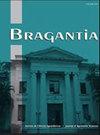TiO2 nanoparticles alleviates the effects of drought stress in tomato seedlings
IF 1.5
4区 农林科学
Q2 AGRICULTURE, MULTIDISCIPLINARY
引用次数: 1
Abstract
: Nanoparticles have been widely used in recent years, to increase plant tolerance under stress conditions. In this study, TiO 2 nanoparticles (NPs) (100 ppm) were applied to tomato plants exposed to drought, and the changes were investigated by physiological, biochemical and proteomic methods. It was determined that TiO 2 NPs treatment increased the relative water content and decreased the proline and malondialdehyde content under drought conditions. As a result of proteomic analysis, it was revealed that the expression of a total of 132 proteins changed as a result of the comparison of the treatment groups (drought vs . control, control-100 vs . control, and drought-100 vs . drought). One of the most striking results of the study was the increase of the amounts of photosynthesis-related proteins and plasmamembrane intrinsic protein in both drought and control groups with TiO 2 NP-treatmtent. The up-regulation of plasmamembrane intrinsic protein is very important for preserving the water potential under drought conditions. Taken together, it was observed that the water potential of the plant was preserved, lipid peroxidation decreased under drought conditions with the application of TiO 2 nanoparticles, and the expression of proteins related to photosynthesis, energy and antioxidant system increased. This study provided clues to the molecular mechanism of the results of many studies available in the literature about nanoparticle treatment under stress condition and showed that TiO 2 nanoparticles have a great potential to be used to increase the stress tolerance of tomato plants under drought conditions.TiO2纳米颗粒减轻了番茄幼苗干旱胁迫的影响
纳米颗粒近年来被广泛应用于提高植物在逆境条件下的耐受性。通过生理生化和蛋白质组学方法,研究了100 ppm tio2纳米颗粒(NPs)对干旱胁迫下番茄植株的影响。结果表明,在干旱条件下,tio2 NPs处理提高了相对含水量,降低了脯氨酸和丙二醛含量。蛋白质组学分析结果显示,与干旱和干旱处理组相比,共有132个蛋白的表达发生了变化。控制,控制-100伏。控制,和干旱-100 vs。干旱)。本研究最显著的结果之一是tio_2 np处理在干旱组和对照组的光合作用相关蛋白和质膜固有蛋白的数量均有所增加。质膜固有蛋白的上调对干旱条件下的水势保持具有重要意义。综上所述,在干旱条件下,二氧化钛纳米颗粒的施用使植物的水势得以保持,脂质过氧化作用减少,光合作用、能量和抗氧化系统相关蛋白的表达增加。本研究为目前已有的纳米颗粒胁迫处理结果的分子机制提供了线索,表明纳米tio2在提高干旱条件下番茄植株的抗逆性方面具有很大的潜力。
本文章由计算机程序翻译,如有差异,请以英文原文为准。
求助全文
约1分钟内获得全文
求助全文
来源期刊

Bragantia
AGRICULTURE, MULTIDISCIPLINARY-
CiteScore
2.40
自引率
8.30%
发文量
33
审稿时长
4 weeks
期刊介绍:
Bragantia é uma revista de ciências agronômicas editada pelo Instituto Agronômico da Agência Paulista de Tecnologia dos Agronegócios, da Secretaria de Agricultura e Abastecimento do Estado de São Paulo, com o objetivo de publicar trabalhos científicos originais que contribuam para o desenvolvimento das ciências agronômicas.
A revista é publicada desde 1941, tornando-se semestral em 1984, quadrimestral em 2001 e trimestral em 2005.
É filiada à Associação Brasileira de Editores Científicos (ABEC).
 求助内容:
求助内容: 应助结果提醒方式:
应助结果提醒方式:


